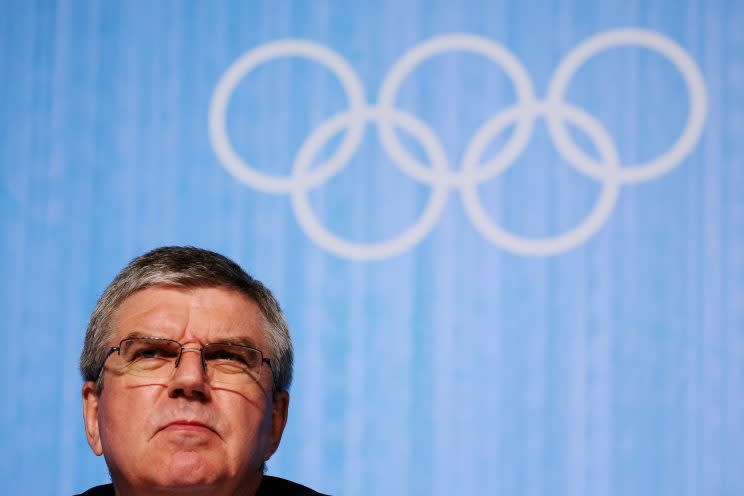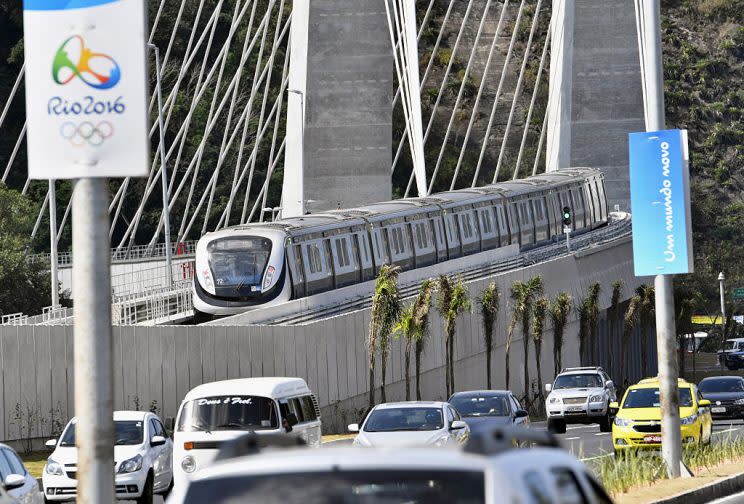IOC straight up lies about public funding and Rio Games

Medal count | Olympic schedule | Olympic news
RIO DE JANEIRO – It’s difficult, at times, to dig out from under the layers of equine excrement that is piled on by the International Olympic Committee. It’s like a well-crafted parfait of deceit and delusion, topped with the delicious froth of the Olympic Spirit.
There were many examples of this as IOC President Thomas Bach spoke on Saturday, one day before the 2016 Rio Games stagger like a mugging victim to the finish line. But this one was perhaps my favorite:
“There is no public money in the organization of these Olympic Games.”
I mean, c’mon, Mr. President. You could have gone with ‘funded by the sale of dragon eggs’ or ‘funded by wagers made using a sports almanac from the future,’ and instead you went with something completely fanciful.
Let’s talk about public funding and the Olympics:
– It’s true that the Rio Olympics’ facilities were built with a majority of private funding. More than London, more than Sochi. But Rio Mayor Eduardo Paes has said, for years, that the estimated $10-12 billion used to fund the Games is a mixture of public and private money. He’s called it a “public-private partnership.”
“The mayor says that the private sector is funding two-thirds of the costs of the venues. The government, meanwhile, is providing public land for the athletes’ village, the Olympic Park and other facilities. These are being constructed by private-sector companies, which in exchange will later sell them as real estate ventures.”
More, from CNBC:
“Research firm IHS noted that around 70 percent of the cost of the Rio Games would be funded by the private sector, potentially offering some relief for the struggling government coffers. The mayor of Rio, Eduardo Paes, has said this represents the biggest contribution from the private sector for any games other than Atlanta 1996, according to media reports. Local sponsors include Brazilian banking chain Bradesco and NET, part of America Movil.”
“In addition, the Brazilian federal government has authorized 2.9 billion reais ($890 million) in emergency aid to Rio to help provide necessary security and infrastructure. The sum will help pay the wages of public servants, including police officers, who have not received salaries since May, according to IHS. This should help assuage the risk of the police, who protested at Rios’s international airport in late June and early July, going on strike during the games.”
So outside of the public funding of the Olympics, there is no public funding of the Olympics.
– Even if you wanted to praise Rio 2016 and the IOC for using a large majority of private funding for the actual construction of facilities and the like, there’s undeniable taxpayer impact. The government is handing over desirable land and it’s giving these private firms tax subsidies and it’s giving them low-interest loans.
Back in the U.S., we call this “corporate welfare” and consider it part of the game in attracting and retaining businesses, but we’re never under the delusion that this isn’t money the public sector is surrendering for the benefit of the private section. Unlike, say, Thomas Bach, apparently.

– Speaking of public money and the Olympics, about those infrastructure projects …
The IOC doesn’t actually consider the billions of dollars spent on Rio’s infrastructure improvements to be an example of public money being used to find the Games. These were “legacy” projects that just so happened to be commissioned and completed in time for the Games.
“The infrastructure projects are privately financed, like the Olympic Village, and publicly financed as a long-term plan from Rio De Janeiro and the state of Rio De Janeiro. Nobody has any doubt that these improvements in Rio De Janeiro are desperately needed,” Bach said.
The idea that Rio “desperately” needed a $3-billion subway extension linking Barra, where the Olympic Park is located, to wealthy neighborhoods like Leblon and Ipanema, is nonsense.
“We had many criticisms of the Olympics as a project, especially because they followed this logic of expansion away from the city where there’s very little infrastructure and continued this historical pattern of rich occupation of the Atlantic coast of Rio,” Renato Cinco, a Rio City Councilman, told The Nation. “So it uses public money to finance this expansion into these zones and very rich real-estate speculators benefited from this use of public funds.”
When it comes to “desperation” and Rio, public funding of infrastructure projects that benefit wealthy areas is a pretty big misapplication of the term. Ask one of those 67,000 people whose houses were bulldozed for the Olympics about the necessity of this project, or for the bus rapid transit lanes that now travel through their old backyards — that the city also funded.
– Then there’s the Paralympics funding issue. As in, they just received a load of public funding in order to actually exist in Rio this year.
“A Brazilian judge on Wednesday lifted an injunction on the federal and city government using public money to help finance the organization of the Olympic and Paralympic Games in Rio de Janeiro.
“Federal judge Guilherme Couto de Castro said the block on transfers of public money could seriously disrupt next month’s Paralympic Games, for which organizers have said they still need additional funding.
“Brazil’s Presidential Chief of Staff Eliseu Padilha announced on Aug. 4, the day before the Rio Olympics’ lavish opening ceremony, that the federal government would provide 120 million reais to the organising committee and the city of Rio would make a further 150 million available.
“The judge said that failure to disburse the funds would mean that the Rio 2016 organising committee would not be able to make payments to national Paralympic organizations for travel, food and uniforms, making it impossible for some countries to participate.”
Now, you could parse out that the Paralympics are not the Olympics, which would completely ignore the close working relationship the IOC and the IPC have in staging the games. But in fairness to Bach, IPC President Phillip Craven told the New York Times: “The Paralympic Games, we own them, not the IOC. If we’ve got problems, then we deal with them. We don’t go to the IOC.”
So maybe we don’t hang that last one completely on Bach. But there’s always another whopper, like:
– Thomas Bach and the IOC’s continued insistence that the Olympics will boost the Paralympics.
“Something similar is happening as happened in London four years ago, where the sales for the tickets for the Paralympic Games were pretty slow – on a higher level than here, but pretty slow, no doubt. But then the ticket sales accelerated with the success of the Olympic Games,” said Bach. “I hope the same will happen here, and that the Brazilians are embracing the Paralympic Games as they did the Olympics Games.”
Look, I love the Paralympics. As Eric Adelson wrote on Friday, “Paralympics aren’t the other Olympics. In a true sense, they are the real Olympics.” That Rio 2016 had to cut funding and its volunteer force for the Paralympics is terrible news.
But there isn’t going to be any miracle turnaround on tickets sales in Rio.
Sorry, there just isn’t. They’ve only sold 12 percent of their tickets in Rio. In London, fans were already selling out Paralympic venues by the end of the Olympic Games because those fans were crack-rock-addicted to the Olympic spirit after seeing Team GB win dozens of gold medals, and they wanted to be a part of those Paralympic events that they were shut out from in the Olympics due to large crowds.
Which brings us back to the IOC, of course.
If the IOC and the Rio Olympics organizers had figured out how to remedy the incredible number of empty seats at their Games, perhaps those conditions in London could have been repeated, and fans would be hooked on the Olympic experience.
But as it stands, this combination of high prices, unbelievable mismanagement (running out of food at venues) and the general apathy of the Brazilian fan to new sports and non-local athletes combined to create the “no-show” Olympics. And why would fans buy Paralympics tickets if they’re not even buying or using their Olympic ones?
“It was a pity, particularly in the first days of the games, that the stadia were not at full capacity,” said Bach.
Finally, some truth.
—
Greg Wyshynski is a writer for Yahoo Sports. Contact him at puckdaddyblog@yahoo.com or find him on Twitter. His book, TAKE YOUR EYE OFF THE PUCK, is available on Amazon and wherever books are sold.
Listen to Yahoo Sports’ Greg Wyshynski podcast from Rio on GRANDSTANDING, featuring a Ryan Lochte Controversy Edition with Pat Forde of Yahoo Sports and Bruce Arthur of the Toronto Star!
Live from Rio: Ryan Lochte, international fugitive; the strange side of the Games:
Grandstanding: A Yahoo Sports podcast
Subscribe via iTunes or via RSS feed

 Yahoo Sports
Yahoo Sports 

